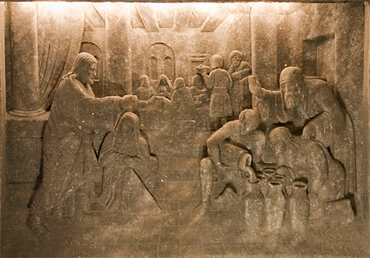Spiegazione di Giovanni 2:4
Da Brian David (tradotto automaticamente in Italiano)

Questo è un versetto dal suono strano, poiché Gesù sembra rivolgersi a sua madre in modo approssimativo e un po' sprezzante. Sembra anche che stia spazzolando via la mancanza di vino come un problema di qualcun altro. Entrambe le impressioni sono apparentemente fuorvianti, però, anche nel significato letterale della storia. Maria non deve essere stata scoraggiata; immediatamente diede istruzioni ai servi di fare qualsiasi cosa Gesù avesse detto loro di fare. E invece di fare spallucce per la mancanza di vino, Gesù si mise subito a fare il suo primo miracolo.
Comunque sia, il significato spirituale offre qualcosa di molto più profondo.
Le nozze di Cana rappresentano una buona chiesa ricettiva tra i gentili. La mancanza di vino significa che la chiesa manca di una vera comprensione delle cose spirituali. Gesù rappresenta la bontà divina del Signore, e sua madre - che rappresenta la vera chiesa del Signore sulla terra - ha notato la mancanza.
Ma l'identità della vera chiesa del Signore sta cambiando; il Signore è nato come Gesù per porre fine alla chiesa ebraica in quel ruolo e lanciare la chiesa cristiana. "Donna" rappresenta semplicemente una chiesa; quando Gesù la chiama così indica che in senso spirituale non ha una chiesa madre. Egli è lì per iniziare una nuova chiesa madre.
"Ora" rappresenta uno stato spirituale, e "venire" significa un'unione di stati spirituali. Così quando Gesù dice "la mia ora non è ancora venuta", significa che il suo stato spirituale non è ancora stato introdotto nella chiesa tra i gentili.
Complessivamente, quindi, questo versetto rappresenta un punto di transizione. Il Signore ha usato la chiesa ebraica per circa 2.000 anni per conservare i significati spirituali, anche se la gente nella chiesa non lo sapeva e non era particolarmente spirituale. Ma è arrivato il momento di cambiare. La nuova chiesa non è ancora iniziata - non ha vino - ma la chiesa ebraica ha perso il suo posto - non è più "madre", ma semplicemente "donna".
Arcana Coelestia #2691
2691. 'God heard the boy's voice' means help at that point. This is clear from the meaning in the internal sense of 'God hearing the voice 'the words used in the historical sense - as bringing help, and from the meaning of 'the boy' as spiritual truth, dealt with already. Here a state is meant in which the spiritual as regards truth existed, for it is said that 'He heard the boy's voice' and soon after in this verse that 'He heard the boy's voice where he was', that is to say, where he was as to state. And, in the explanations of the verses immediately before, this state was shown to be one of utmost grief because truth had been taken away. The reason it was the boy's voice, not Hagar's, that God is said to have heard is that the state of the spiritual man is the subject. 'The boy', or Ishmael, represents the member of the spiritual Church, 'Hagar his mother' the affection for cognitions of truth, it being within this affection that the grief was felt. Man's rational is born from the affection for factual knowledge as a mother, 1895, 1896, 1902, 1910, 2094, 2524, but his spiritual is born from the affection for cognitions of truth acquired from doctrine, chiefly from the Word. Here the spiritual itself is 'the boy', and the affection for cognitions of truth is 'Hagar'.






